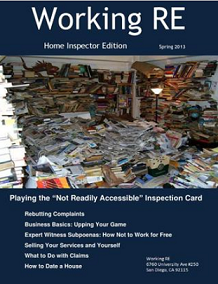
|
Home Inspectors Edition | Circulation 22,000 | Advertise | Subscribe | |
Published by OREP, E&O Insurance Experts | March 2013 |
 |
>
Click to Print
|
Studies have shown that upon the initial
meeting between you and your client, it usually takes less than two
minutes for them to form an opinion as to whether or not they feel
confident in your ability to do the job.
>
This story is excerpted from the
Working RE Magazine Home Inspector Edition
>
New:
OREP now offering E&O and General Liability Coverage in Minimum
Premium,
click here for more.
Business Basics: Upping Your Game
By Jerry McCarthy, CREIA Fellow
Here's how you can increase your success by being more
"professional."
The perception of professionalism equates to confidence and without the client's confidence, the inspection process is over before it even begins. Home inspectors who exude confidence in their abilities earn the confidence of their clients and the agents who represent them. Confidence has its own particular odor that can be sensed by most people but one must be very careful because there is a very fine line between self-confidence and arrogance.
The homebuyer's initial perception of their home inspector usually sets the tone for the ensuing performance. Studies have shown that upon the initial meeting between you and your client, it usually takes less than two minutes for them to form an opinion as to whether or not they feel confident in your ability to do the job. It's really all about trust, which is vital in purchasing a home. Homebuyers are investing their life savings, in many cases, so their home inspector had better earn their trust.
It follows that the client's perception
of their home inspector regarding his/her knowledge, experience,
honesty and skill at detecting and reporting defects is
tantamount to the inspector's success or failure in a highly
competitive industry. Can we trust this person? Does he/she know
what they are talking about? Will they find anything wrong
and will they be thorough? These are the common concerns of most
homebuyers when first meeting their inspector. Never lose sight
of the fact that home buyers have already found the positive
things they like about the home. They have opened escrow and now
you're there to detect and disclose the negative things about
their new home. In other words, your job is to help them make an
informed purchasing decision.
The client's perception can occur almost immediately in that personal impressions are made by visual means such as the condition of the inspector's vehicle, personal appearance, dress, the assortment of tools they carry, their attitude, and most important, their communication skills. It doesn't matter how experienced or knowledgeable the inspector may be in construction technology or the building codes because without excellent communication skills, they're in the wrong profession.
(story continues below)
Better Early
Was
the inspector on time for the appointment? I was taught early on that
if you don’t arrive at least ten minutes early, you are late. I
have found this to be generally true of many successful old-timers who
have shared with me that they always arrive early to their
inspections. This allows them the time to check the lay of the land,
get set up, alert the property owners (contain their pets) and perhaps
even complete their roof and chimney inspections before the arrival of
their clients. Never leave your ladder up after you have inspected the
roof, especially when your clients have brought their kids along.
It’s important that you put the homeowner at
ease and always treat them with great respect, even when they act
defensively or have the manners of a goat. If they question you
about any of your findings, assure them their agent will share a copy
of your report with them. If they have any questions let them know
they may call you. Remember, home sellers may become a future client.
Also, they or the listing agent may call you anyway if the deal goes
south. Then you will join the illustrious ranks of “Deal Killers
Anonymous.” How many times have you heard the expression, “Please
pardon my messy house?” We don’t care about the mess but we do need to
get into the napping baby’s room and the owner’s “friendly” pit bull
requires being properly secured.
Trust
Trust
does not come easily and can be fleeting. Telling jokes, complaining
about local traffic, sharing your political views, becoming overly
familiar, and certainly announcing you just came from the “house from
hell” are not wise choices. Your clients are not your friends
nor do they want to be. You are there to provide a service to
them, no more, no less. Credibility must be carefully nurtured and is
fragile at best. If you don’t know the answer to a question, admit it
but counter with, “I will find out and let you know.” Then do it! Pay
absolute attention to your client’s questions and concerns. Keep
focused on the job at hand. If your clients don’t follow you every
step of the way and elect to start smelling the roses while you’re
explaining several defects in the electrical service panel, be
patient.
If the seller
decides to join your little group and keeps chattering about what a
great house he/she is selling, stop and explain to them that you
prefer to be alone with your clients as you need their complete
attention. I used to say, “I cannot focus on performing a really
thorough inspection with distractions and you certainly wouldn’t want
me to miss anything, would you?” This generally did the trick
and if it didn’t, I went to plan B. “This inspection is a contractual
arrangement between my clients and me and the sharing of information
is privileged.” Or, in other words, get lost! Never assume
anything. The young lady accompanying an older gent may not be
his daughter but rather his newly minted trophy wife. Same sex couples
are now quite common homebuyers. Direct most of your explanations to
the wife because women usually make the purchasing decision.
When I find my client’s attention wandering I tell them, “Look, I’ll
proceed with my inspection but every now and then we need to have a
short private meeting so I can bring you up to speed on what I have
found.” At the end of each meeting I would always say, “What I
just told you will be in my written report so when you read it, it
will be familiar to you. If you have any additional concerns
about it please call me.” I always encouraged my clients to ask
questions and try to make them feel part of the inspection process.
“Do you have any young children?” I always inquire, not to be nosey
but to see if I have to emphasize occupant safety hazards that
particularly applied to small children.
Of course no inspection goes on very long before the question arises,
“How much will that cost to fix or replace?” The best answer is, “I
don’t know.” Anyone who quotes prices, even “ballpark” prices is
asking for real trouble. You tell them a new roof should cost about
$5,000 and later you get a call that their roof cost is double that
figure. They will want to know when you are sending your check for the
balance. Remember, the only valid estimate for work is in written form
called a “contractual bid,” submitted by a qualified person who is
going to perform the work.
Qualified, in inspection industry lingo, means state licensed. By
the same token, never recommend contractors by name as you are opening
the litigation gate for a frivolous referral. Encourage your client’s
agent to assume that responsibility.
Summary
At the conclusion of your inspection a short summary is called for.
This should always be arranged off site, such as across the street or
near your truck if the property owners are present. This conference
should only include your clients and their legal representative, their
agent. If it’s a dual agent, so be it. The very last thing you
want to do is to share your findings in front of the homeowners who
have long labored under the illusion their home is in absolute perfect
condition and the longer they have lived in it the more perfect it has
become. When I first got into this profession, I had an older
agent who invariably would announce, “Jerry, when you’re finished, I
want you to come into the living room and tell everybody what’s wrong
with this house.” Yeah right!
The very last impression you want to leave your client with
is your availability to communicate anything they don’t understand in
your written report or was later discovered that you may have failed
to address. Receiving a call from a client after your inspection and
close of escrow sure as hell beats getting one from their attorney.
Don't accept refreshments and don’t sit down. You’re not exactly a welcome guest. Keep everything on a totally professional level because that is
what you must be perceived to be, a professional at all times to all
parties involved in the transfer of property. They are not your
friends nor do they want to be. You are a facilitator of
information of which much may be negative. Maintain a professional
attitude at all times. Never become unnerved and blow a positive
perception it took you four hours or more to establish. A final word
about what has become oh so common in our current society;
“perception” often becomes most folk’s reality.
About the Author
Jerry was awarded CREIA’s Inspector of the Year in 2000, one of the 25
Most Influential Members of the California Real Estate Inspectors
Association (CREIA) since its founding, was elected CREIA Fellow in
2003 and was awarded the John Daly Award, CREIA’s highest honor, in
2007. Jerry also holds an ICC professional inspector membership and is
ICC certified as a Residential Combination Inspector. Jerry is
qualified in the California Supreme Court as an expert witness in the
standard of care for California home inspectors, residential
construction defects and landlord/ tenant litigation.
Reprinted with permission from the California Real Estate Inspection
Association (CREIA), www.creia.org, 800-848-7342 for
more information about the non-profit association.
ATTENTION: You are receiving WRE Online News because you opted in at WorkingRE.com or purchased E&O insurance from OREP. WRE Online News Edition provides news-oriented content twice a month. The content for WRE Special Offer Editions is provided by paid sponsors. If you no longer wish to receive these emails from Working RE, please use the link found at the bottom of this newsletter to be removed from our mailing list.




